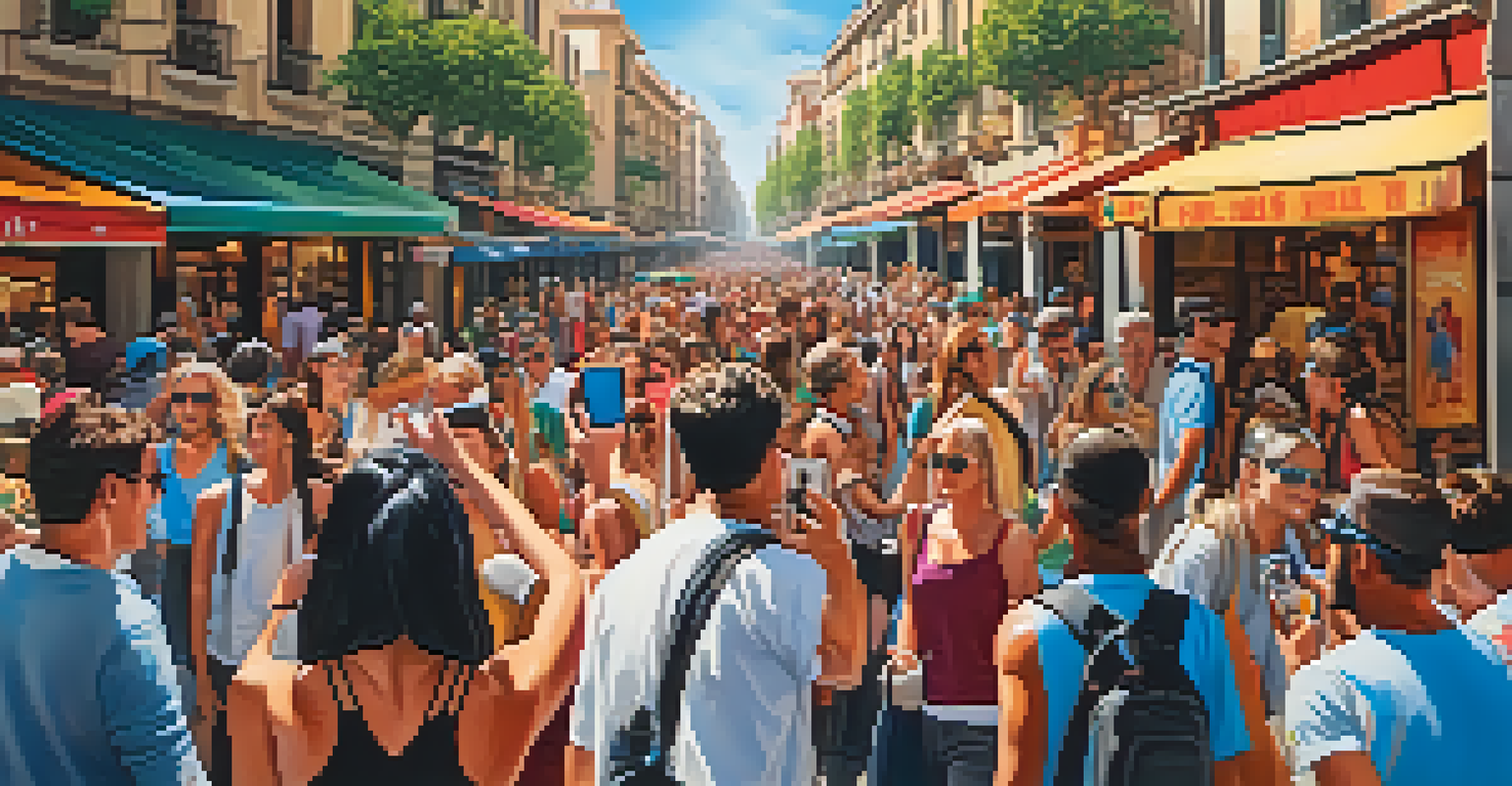How Over-Tourism Affects Destinations and Local Life

What is Over-Tourism and Its Rise in Popularity?
Over-tourism refers to a situation where a destination receives more visitors than it's capable of handling, leading to various negative consequences. This phenomenon has surged, especially with the rise of social media, where picturesque spots go viral, drawing crowds eager to experience the 'Instagrammable' moment. Cities and natural wonders once seen as hidden gems have now become overcrowded tourist traps, challenging their sustainability.
Tourism is not just about seeing new places; it's about experiencing cultures and communities in a way that respects and preserves them.
For instance, places like Venice and Barcelona have seen millions flock to their streets, often outnumbering locals. The allure of unique experiences often overshadows the need for responsible travel choices. Consequently, as travelers prioritize popular spots over lesser-known alternatives, the cycle of over-tourism continues to spiral.
Understanding the dynamics of over-tourism is crucial for both travelers and local communities. This awareness can foster more sustainable tourism practices, encouraging visitors to respect local cultures while seeking authentic experiences. By recognizing the impact of their travel choices, tourists can help preserve the very destinations they love.
Economic Effects of Over-Tourism on Local Businesses
While tourism can boost a local economy, over-tourism often leads to an imbalance that can be detrimental to small businesses. In many cases, large corporations dominate the market, pushing local shops and restaurants out of business due to rising rents and operating costs. This shift can lead to a homogenization of the local culture, where unique offerings are replaced by generic franchises.

Moreover, local businesses may find themselves overwhelmed during peak seasons, unable to meet the demand without sacrificing quality. For instance, a small café that normally serves a handful of locals may struggle to provide the same personalized service when inundated with tourists. This can result in a decline in customer satisfaction and damage the reputation of businesses that once thrived on personal connections.
Over-Tourism Threatens Local Culture
The influx of tourists can dilute local traditions and lead to a loss of authenticity in communities.
Balancing economic benefits with the needs of local businesses requires careful planning and community involvement. Encouraging tourists to explore local products and experiences can help create a more sustainable economy that supports small businesses, ultimately benefiting both visitors and residents alike.
Environmental Consequences of Over-Tourism
The environmental impact of over-tourism is often staggering, leading to issues such as pollution, habitat destruction, and resource depletion. Popular natural attractions, like national parks, can suffer from trail erosion, littering, and wildlife disturbances as foot traffic increases. These changes not only affect the local ecosystem but also threaten the very beauty that draws tourists in the first place.
Traveling – it leaves you speechless, then turns you into a storyteller.
For example, the Great Barrier Reef has seen significant coral bleaching due to climate change exacerbated by increased visitor numbers. The pressure on natural resources can lead to water shortages and waste management challenges in destinations that are ill-equipped to handle large crowds. As popular sites become more damaged, the allure begins to fade, creating a vicious cycle.
Addressing these environmental concerns is crucial for the future of travel. Initiatives such as limiting visitor numbers, promoting off-peak travel, and encouraging eco-friendly practices can help mitigate the negative effects of over-tourism. By prioritizing sustainability, both travelers and locals can work together to protect their cherished environments.
Cultural Impact of Over-Tourism on Local Communities
Over-tourism can significantly alter the cultural fabric of local communities, often leading to a loss of authenticity. As destinations bend to the demands of tourists, traditional practices and customs may be diluted or commercialized. This shift can make it challenging for locals to maintain their cultural identity amidst the influx of visitors seeking curated experiences.
For instance, in some areas, traditional festivals may adapt to cater to tourists rather than celebrating local heritage. The essence of these events can shift from community-driven celebrations to merely entertaining visitors. This can lead to frustration among residents who feel their culture is being commodified, resulting in a disconnect between locals and tourists.
Economic Strain on Local Businesses
Over-tourism often benefits large corporations at the expense of small businesses, leading to a homogenized local culture.
To preserve cultural integrity, it's essential to promote responsible tourism that values local traditions. Encouraging visitors to engage with authentic experiences—like cooking classes or community-led tours—can foster mutual respect and understanding. By prioritizing cultural preservation, both tourists and locals can benefit from enriching interactions.
Social Strain: How Over-Tourism Affects Community Life
As tourist numbers swell, local residents often experience a strain on their daily lives. Overcrowding can lead to increased noise levels, traffic congestion, and a general sense of discomfort in once-peaceful neighborhoods. Locals may find it challenging to navigate their own streets, feeling like outsiders in their own communities, which can foster resentment towards visitors.
Additionally, the influx of tourists can drive up the cost of living, making it harder for residents to afford housing and essential services. In places like Amsterdam, locals have expressed frustration over rising rents as property owners choose to cater to tourists instead of residents. This shift can lead to a loss of community spirit as long-term residents are pushed out.
To combat these social strains, communities and local governments must engage in dialogue with residents and tourists alike. Solutions could involve creating designated tourist zones or implementing regulations that protect local neighborhoods. By fostering a more balanced coexistence, communities can preserve their character while still welcoming visitors.
The Role of Technology in Managing Over-Tourism
Technology has emerged as a powerful tool in addressing the challenges posed by over-tourism. From smart apps that provide real-time visitor data to platforms promoting off-the-beaten-path destinations, tech can help distribute tourist traffic more evenly. For example, some cities are now utilizing heat maps to identify congested areas and redirect visitors to lesser-known attractions.
Furthermore, social media can serve both as a catalyst for over-tourism and a means to mitigate it. By promoting sustainable travel practices and showcasing quieter destinations, influencers can help shift perceptions of what travel should look like. This dual role of technology emphasizes the need for responsible usage to foster positive change.
Environmental Damage from Crowds
Increased visitor numbers can result in pollution and habitat destruction, threatening the very attractions that draw tourists.
Ultimately, leveraging technology effectively can enhance the travel experience while preserving local communities. By integrating innovative solutions, destinations can manage visitor numbers and promote sustainable tourism practices that benefit everyone involved.
Moving Towards Sustainable Tourism Practices
Sustainable tourism is about finding a balance between enjoying travel and preserving destinations for future generations. By prioritizing eco-friendly practices, minimizing waste, and supporting local businesses, travelers can contribute to more sustainable tourism. Simple actions like choosing public transport or participating in local conservation efforts can make a significant difference.
Moreover, raising awareness about the impacts of over-tourism can empower travelers to make informed choices. Seeking out eco-conscious accommodations or engaging in community-based tourism can enhance the travel experience while fostering a sense of responsibility. The more travelers understand the consequences of their actions, the more they can champion sustainability.

In essence, sustainable tourism is a collective effort that requires participation from tourists, local governments, and businesses alike. By embracing this mindset, we can ensure that our favorite destinations remain vibrant and inviting for generations to come.